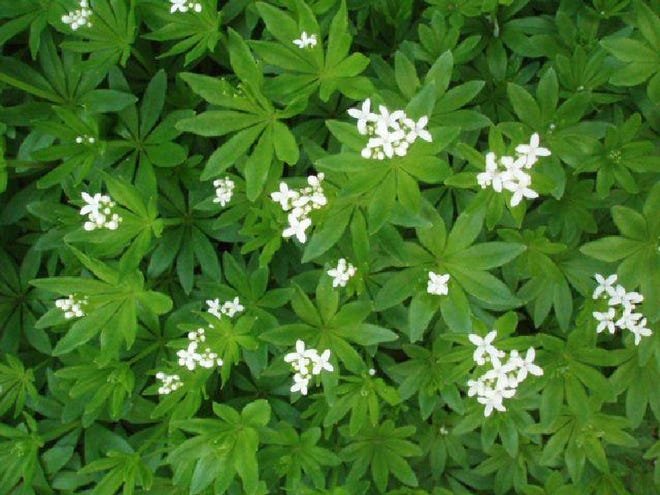Galium Odoratum (Rubiaceae)
Sweet woodruff is a low growing ground cover that is native to much of Europe where it enjoys a long history. It is a colonizing plant that grows well in dappled shade and around the bases of other trees and shrubs. It needs consistent moisture. In June it can cover the ground in white flowers. The lance shaped leaves, borne on a single stem forming a whorl are the source of the sweet smell. In Germany and Austria, an herbal syrup called Maikrautsirup is made in May before the plant flowers. Used for drizzling on deserts or sweetening a summer drink. A very unique taste that reminds me of fresh cut hay. Best at the margins because it can be aggressive in a garden setting.
Sweet woodruff is a low growing ground cover that is native to much of Europe where it enjoys a long history. It is a colonizing plant that grows well in dappled shade and around the bases of other trees and shrubs. It needs consistent moisture. In June it can cover the ground in white flowers. The lance shaped leaves, borne on a single stem forming a whorl are the source of the sweet smell. In Germany and Austria, an herbal syrup called Maikrautsirup is made in May before the plant flowers. Used for drizzling on deserts or sweetening a summer drink. A very unique taste that reminds me of fresh cut hay. Best at the margins because it can be aggressive in a garden setting.
Sweet woodruff is a low growing ground cover that is native to much of Europe where it enjoys a long history. It is a colonizing plant that grows well in dappled shade and around the bases of other trees and shrubs. It needs consistent moisture. In June it can cover the ground in white flowers. The lance shaped leaves, borne on a single stem forming a whorl are the source of the sweet smell. In Germany and Austria, an herbal syrup called Maikrautsirup is made in May before the plant flowers. Used for drizzling on deserts or sweetening a summer drink. A very unique taste that reminds me of fresh cut hay. Best at the margins because it can be aggressive in a garden setting.


